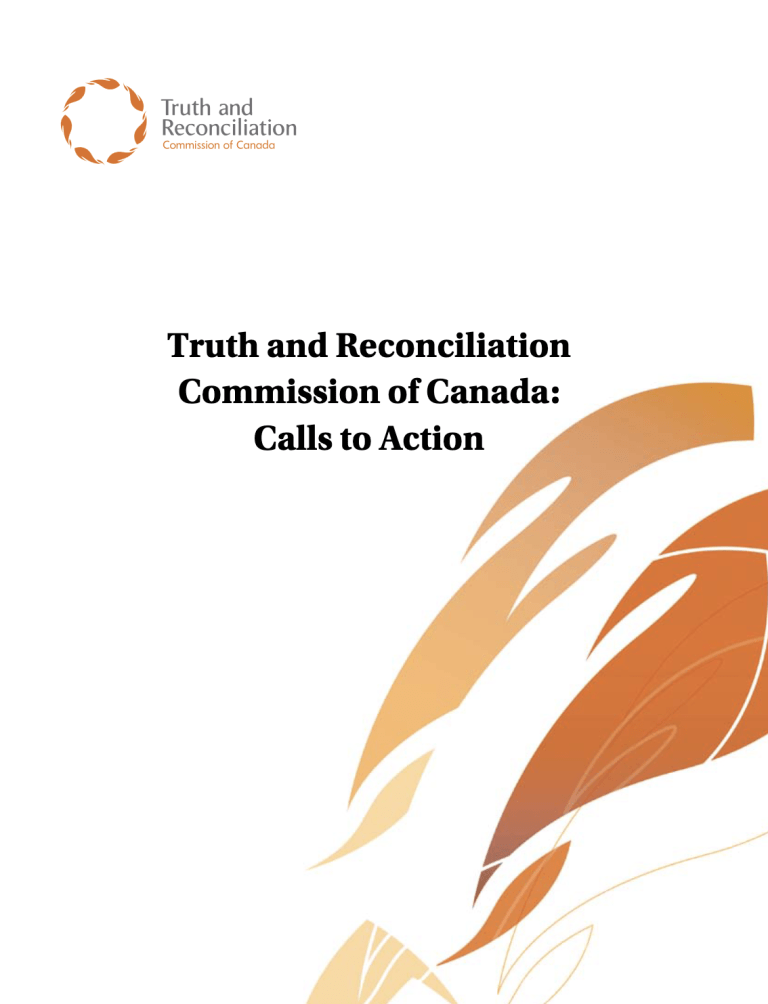95 search results
Reconciliation
Church apologies and reconciliation
Recommendation 61: We call upon church parties to the Settlement Agreement, in collaboration with Survivors and representatives of Aboriginal organizations, to establish permanent funding to Aboriginal people for:- Community-controlled healing and reconciliation projects.
- Community-controlled culture- and language revitalization projects.
- Community-controlled education and relationship-building projects. iv. Regional dialogues for Indigenous spiritual leaders and youth to discuss Indigenous spirituality, self-determination, and reconciliation.
-
Category and theme:
Audience:
Groups affected:
Reconciliation
Education for reconciliation
Recommendation 62: We call upon the federal, provincial, and territorial governments, in consultation and collaboration with Survivors, Aboriginal peoples, and educators, to:- Make age-appropriate curriculum on residential schools, Treaties, and Aboriginal peoples’ historical and contemporary contributions to Canada a mandatory education requirement for Kindergarten to Grade Twelve students.
- Provide the necessary funding to post-secondary institutions to educate teachers on how to integrate Indigenous knowledge and teaching methods into classrooms.
- Provide the necessary funding to Aboriginal schools to utilize Indigenous knowledge and teaching methods in classrooms.
- Establish senior-level positions in government at the assistant deputy minister level or higher dedicated to Aboriginal content in education.
-
Category and theme:
Audience:
Groups affected:
Reconciliation
Education for reconciliation
Recommendation 63: We call upon the Council of Ministers of Education, Canada to maintain an annual commitment to Aboriginal education issues, including:- Developing and implementing Kindergarten to Grade Twelve curriculum and learning resources on Aboriginal peoples in Canadian history, and the history and legacy of residential schools.
- Sharing information and best practices on teaching curriculum related to residential schools and Aboriginal history.
- Building student capacity for intercultural understanding, empathy, and mutual respect. iv. Identifying teacher-training needs relating to the above.
-
Category and theme:
Groups affected:
Reconciliation
Education for reconciliation
Recommendation 64: We call upon all levels of government that provide public funds to denominational schools to require such schools to provide an education on comparative religious studies, which must include a segment on Aboriginal spiritual beliefs and practices developed in collaboration with Aboriginal Elders.-
Category and theme:
Audience:
Groups affected:
Reconciliation
Education for reconciliation
Recommendation 65: We call upon the federal government, through the Social Sciences and Humanities Research Council, and in collaboration with Aboriginal peoples, post-secondary institutions and educators, and the National Centre for Truth and Reconciliation and its partner institutions, to establish a national research program with multi-year funding to advance understanding of reconciliation.-
Category and theme:
Audience:
Groups affected:
Reconciliation
Youth programs
Recommendation 66: We call upon the federal government to establish multi year funding for community-based youth organizations to deliver programs on reconciliation, and establish a national network to share information and best practices.-
Category and theme:
Groups affected:
Reconciliation
Museums and archives
Recommendation 67: We call upon the federal government to provide funding to the Canadian Museums Association to undertake, in collaboration with Aboriginal peoples, a national review of museum policies and best practices to determine the level of compliance with the United Nations Declaration on the Rights of Indigenous Peoples and to make recommendations.-
Category and theme:
Groups affected:
Reconciliation
Museums and archives
Recommendation 68: We call upon the federal government, in collaboration with Aboriginal peoples, and the Canadian Museums Association to mark the 150th anniversary of Canadian Confederation in 2017 by establishing a dedicated national funding program for commemoration projects on the theme of reconciliation.-
Category and theme:
Groups affected:
Reconciliation
Museums and archives
Recommendation 69: We call upon Library and Archives Canada to:- Fully adopt and implement the United Nations Declaration on the Rights of Indigenous Peoples and the United Nations Joinet-Orentlicher Principles, as related to Aboriginal peoples’ inalienable right to know the truth about what happened and why, with regard to human rights violations committed against them in the residential schools.
- Ensure that its record holdings related to residential schools are accessible to the public.
- Commit more resources to its public education materials and programming on residential schools.
-
Category and theme:
Audience:
Groups affected:
Reconciliation
Museums and archives
Recommendation 70: We call upon the federal government to provide funding to the Canadian Association of Archivists to undertake, in collaboration with Aboriginal peoples, a national review of archival policies and best practices to:- Determine the level of compliance with the United Nations Declaration on the Rights of Indigenous Peoples and the United Nations Joinet-Orentlicher Principles, as related to Aboriginal peoples’ inalienable right to know the truth about what happened and why, with regard to human rights violations committed against them in the residential schools.
- Produce a report with recommendations for full implementation of these international mechanisms as a reconciliation framework for Canadian archives.
-
Category and theme:
Groups affected:
